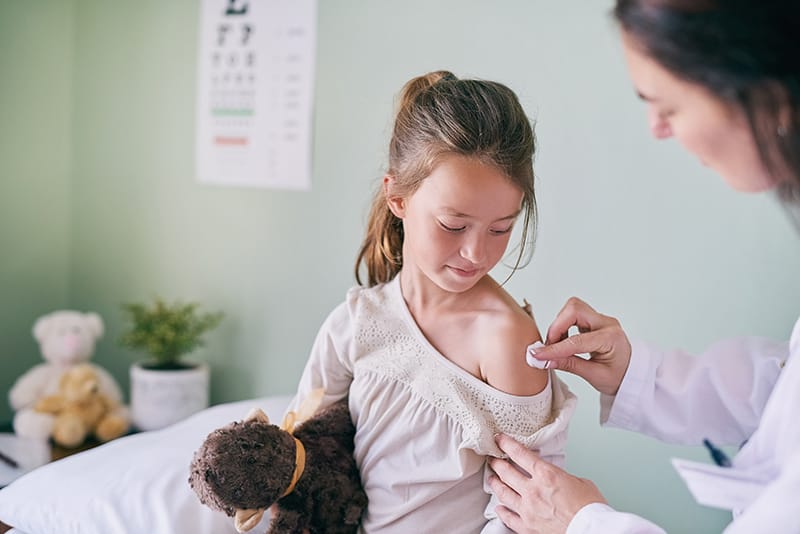As your kids grow, their healthcare needs evolve — but regular check-ups and vaccinations remain just as important. Those early well-child visits helped protect your child from serious illnesses, and as they get older, timely vaccinations continue to play a key role in keeping them healthy. While the number of required shots decreases after the toddler years, it’s still essential to stay on track with booster doses and age-specific immunizations through adolescence.
Why do children need all those vaccines?
Immunization is important at every age, but even more so for children. Young children have undeveloped immune systems. Exposure to some diseases can be life-threatening. Vaccinations protect your kids and everyone around them from these serious conditions.
It’s called herd immunity. Disease travels fast. One person can quickly spread an illness to the rest of the community. If enough people get sick, it can lead to an outbreak.
Vaccinations help prevent outbreaks of certain diseases, protecting both those who get the shots and those who are unable to or have weakened immune systems.
Are vaccinations required for children?
Yep. In Iowa, many vaccinations are mandatory. Iowa law requires immunizations for all children attending licensed day care centers, elementary and secondary schools — even home schools. Your children must be vaccinated according to the Iowa Department of Public Health immunization schedule.
But IDPH only outlines the minimum immunization requirements. There are vaccines outside the law that are still recommended for your kids. The Iowa Clinic follows the vaccination schedule recommended by the CDC and American Academy of Pediatrics.
Recommended Vaccination Schedule for Children
This chart outlines which vaccines are recommended at each age. Or skip to your child’s age below to learn which immunizations are necessary and why.
Birth
The shots start before you even get out of the hospital. Newborns receive a hepatitis B vaccine to protect against liver infection.
Two Months
Your child gets a second hepatitis B shot as early as one month, but no later than two months. But that’s just the beginning. Two-month-old babies also get immunized for:
- Rotavirus — A common cause of diarrhea, rotavirus is a highly contagious virus that can easily spread between children. Instead of a shot, the vaccine is given in oral drops.
- Diphtheria, tetanus and acellular pertussis (DTaP) — One-shot protects against these three common diseases caused by bacteria. Both pertussis, also known as whooping cough, and diphtheria can cause breathing problems in children.
- Haemophilus influenzae type b (Hib) — Before the vaccine, Hib disease was a common cause of bacterial meningitis in kids under five years old. The vaccination effectively eliminated 99 percent of cases.
- Pneumococcal conjugate — Pneumococcal disease can cause infections in the ear, blood, lungs, brain and spinal cord. Children two and under are at the most risk.
- Inactivated poliovirus — There hasn’t been a new case of polio in the United States in 35 years — thanks to vaccinations. It’s important to keep it that way to prevent this crippling infectious disease from coming back.
Four Months
At four months, babies get a second dose of rotavirus, DTaP, Hib, pneumococcal and poliovirus to continue building their immunity.
Six Months
Third DTaP, Hib, pneumococcal, rotavirus and polio vaccinations are given to children six months old. They may also get a third hepatitis B shot any time between six months and 18 months.
12 Months
There are a handful of vaccinations recommended once your child turns one. They get fourth doses of Hib and pneumococcal. They also get their first immunizations for:
- Influenza — The flu shot protects against the expected flu strains that year. Your child will get a flu shot sooner if flu season begins before their first birthday.
- Measles, mumps and rubella (MMR) — This one-shot protects against three potentially serious viral diseases.
- Varicella — Chickenpox is a highly contagious virus that can be serious in infants under the age of 12 months, which is why they cannot be vaccinated until they turn one.
- Hepatitis A — An infection of the liver, hepatitis A is rarely serious, but can be hard to shake. Symptoms can last a long time or come back after several months.
15 Months
At 15 months, your child will receive pneumococcal conjugate, a fourth dose of DTaP, and Hib.
18 Months
When your child turns one-and-a-half, they catch up on any immunizations they missed in the first 18 months. Some shots, like DTaP, require six months in between vaccinations. Depending on when your appointments are scheduled, your pediatrician may hold off on certain vaccines until this point. They will also get the second dose of hepatitis A to complete the series.
Four to Six Years
Between the ages of four and six, your kid gets their final DTaP, polio, MMR and Varicella (chickenpox) vaccines.
11 to 12 Years
At 11 to 12 years, your child is immunized for:
- Tetanus, diphtheria and acellular pertussis (Tdap) — The naming order isn’t the only difference from the DTaP shot. The Tdap vaccine boosts immunity for these three diseases in the time since the final DTaP vaccine. This version is designed for adolescents and adults and is repeated every 10 years.
- Meningococcal — Meningococcal disease (meningitis) is a severe bacterial infection that attacks the lining of the brain and spinal cord and is commonly spread between 11- and 12-year-olds.
- Human papillomavirus (HPV) — HPV is the virus that causes cervical cancer. Your child, boy or girl, should receive two doses, six months apart, to prevent this virus.
16 Years
Sixteen is a milestone year for your child. It marks the end of their childhood vaccination schedule! To end the series, your child is immunized for:
- Second dose of meningococcal
- 1st dose of meningococcal B with the second dose in 6 months
- Catch up on HPV series if not already completed
Annual Flu Shots
Yearly flu vaccinations are recommended. Even though the vaccine is not 100% effective, it’s better to get a flu shot than risk hospitalization or death against something that could have been prevented. Flu shots are quick, easy and readily available. You may not even need to schedule a separate appointment to get your kids vaccinated against the flu every year because their school may offer flu shots.
What vaccines are required for school?
There is little variation between the recommended vaccination schedule and the immunizations required by Iowa law. Children are required to be up-to-date on all their shots with a couple exceptions: rotavirus, HPV and influenza. Although recommended by the CDC and your pediatrician, these vaccines are not mandatory for school-age children in Iowa.
You’ll have to provide an updated certificate of immunization to your day care center or school every year to verify your child’s vaccines.
Once your child gets through the bulk of their shots in the early years, they can receive the recommended — and mandatory — vaccines at their annual school physical or well child visit. No shots means no school, so schedule an appointment with your pediatrician to get your kid caught up on their vaccines.
Updated: April 2025


